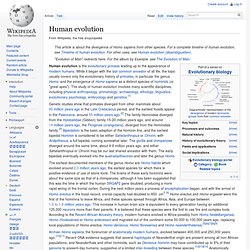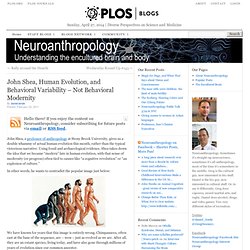

Poll: Just 39% believe in evolution. From NBC's Mark MurrayToday it's not only Abraham Lincoln's birthday; it's also Charles Darwin's.

And a brand-new Gallup poll tied to Darwin's birthday finds that just 39% of Americans believe in evolution. As expected, Gallup notes, education plays a big role here: 74% of those with post-graduate degrees believe in evolution. Poll: Just 39% believe in evolution. Poll: Just 39% believe in evolution. Human evolution. Human evolution is the evolutionary process leading up to the appearance of modern humans.

While it began with the last common ancestor of all life, the topic usually covers only the evolutionary history of primates, in particular the genus Homo, and the emergence of Homo sapiens as a distinct species of hominids (or "great apes"). The study of human evolution involves many scientific disciplines, including physical anthropology, primatology, archaeology, ethology, linguistics, evolutionary psychology, embryology and genetics.[1] John Shea, Human Evolution, and Behavioral Variability – Not Behavioral Modernity. Hello there!

If you enjoy the content on Neuroanthropology, consider subscribing for future posts via email or RSS feed. John Shea, a professor of anthropology at Stony Brook University, gives us a double whammy of actual human evolution this month, rather than the typical victorious narrative. Using fossil and archaeological evidence, Shea takes down the idea that we became “modern” late in human evolution, with that sense of modernity (or progress) often tied to causes like “a cognitive revolution” or “an explosion of culture.” In other words, he wants to contradict the popular image just below: